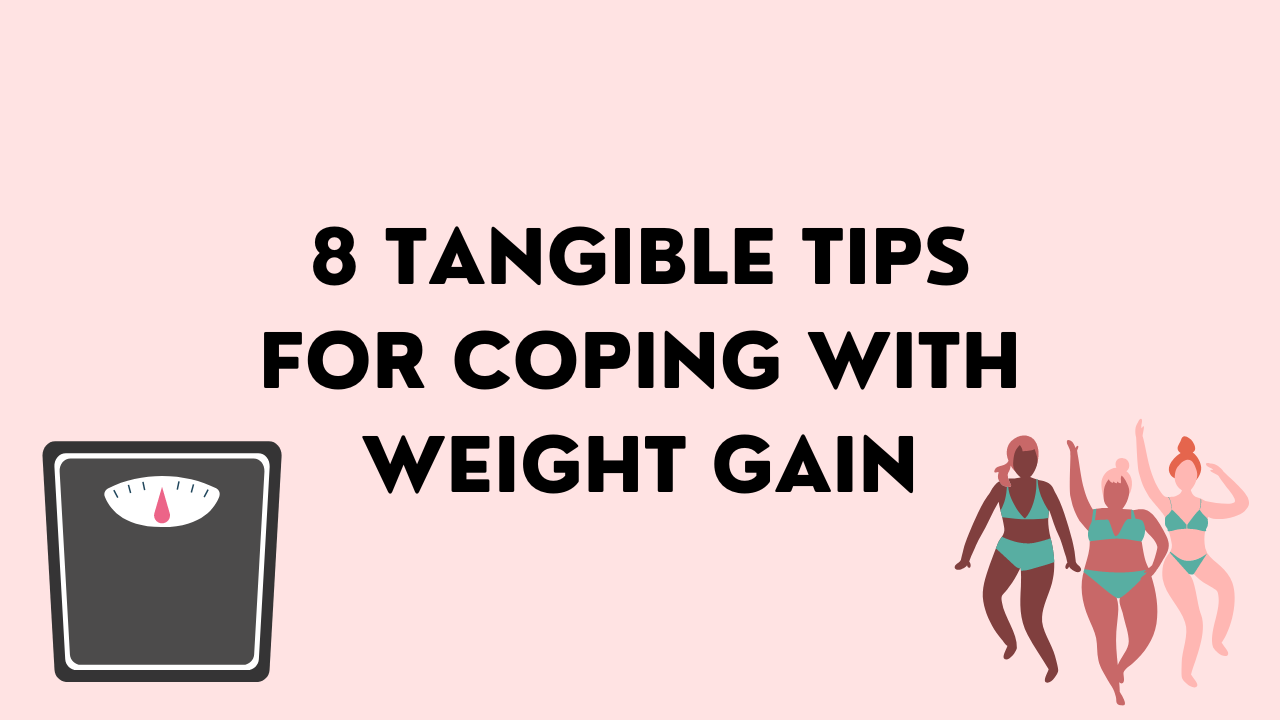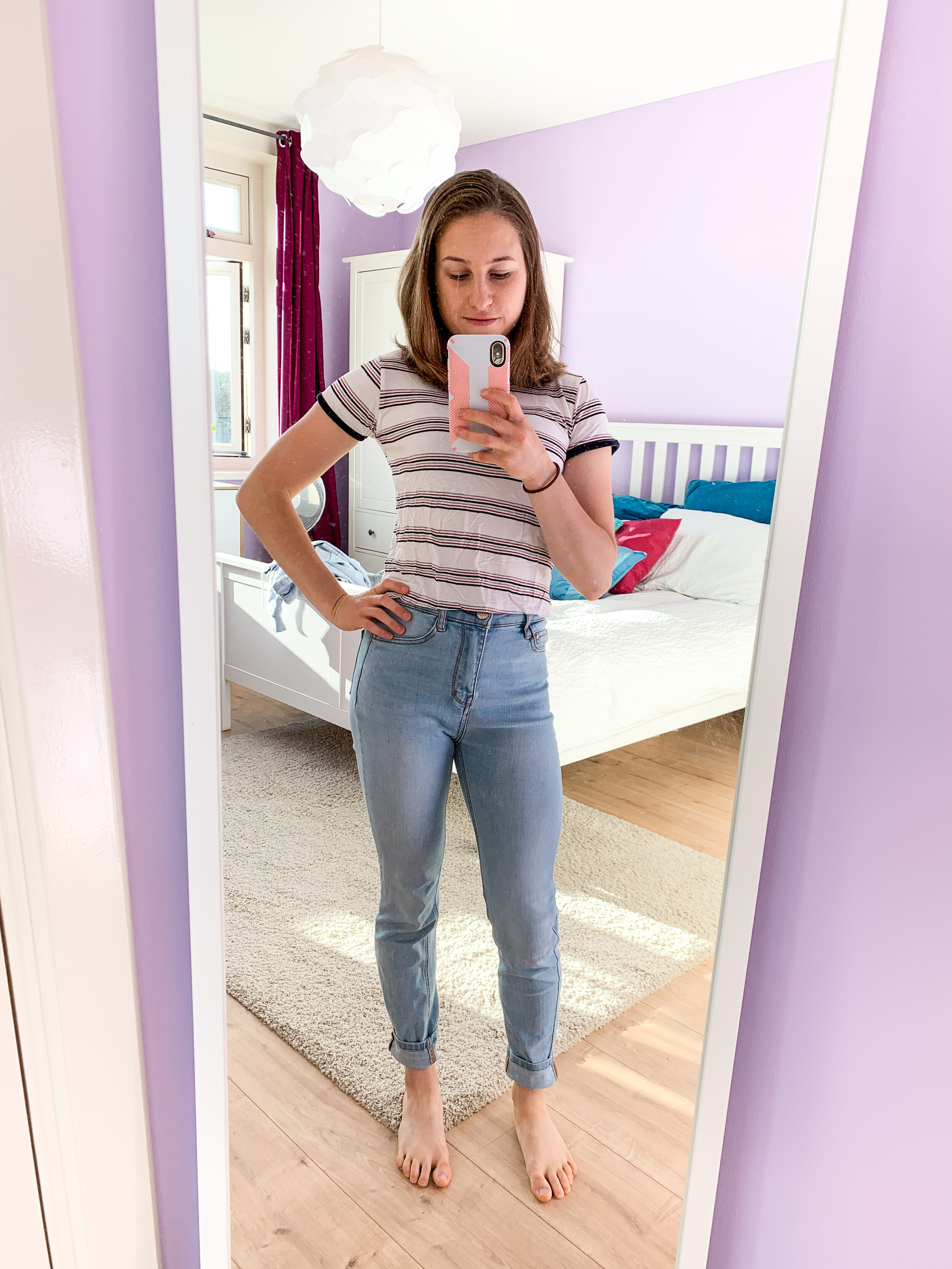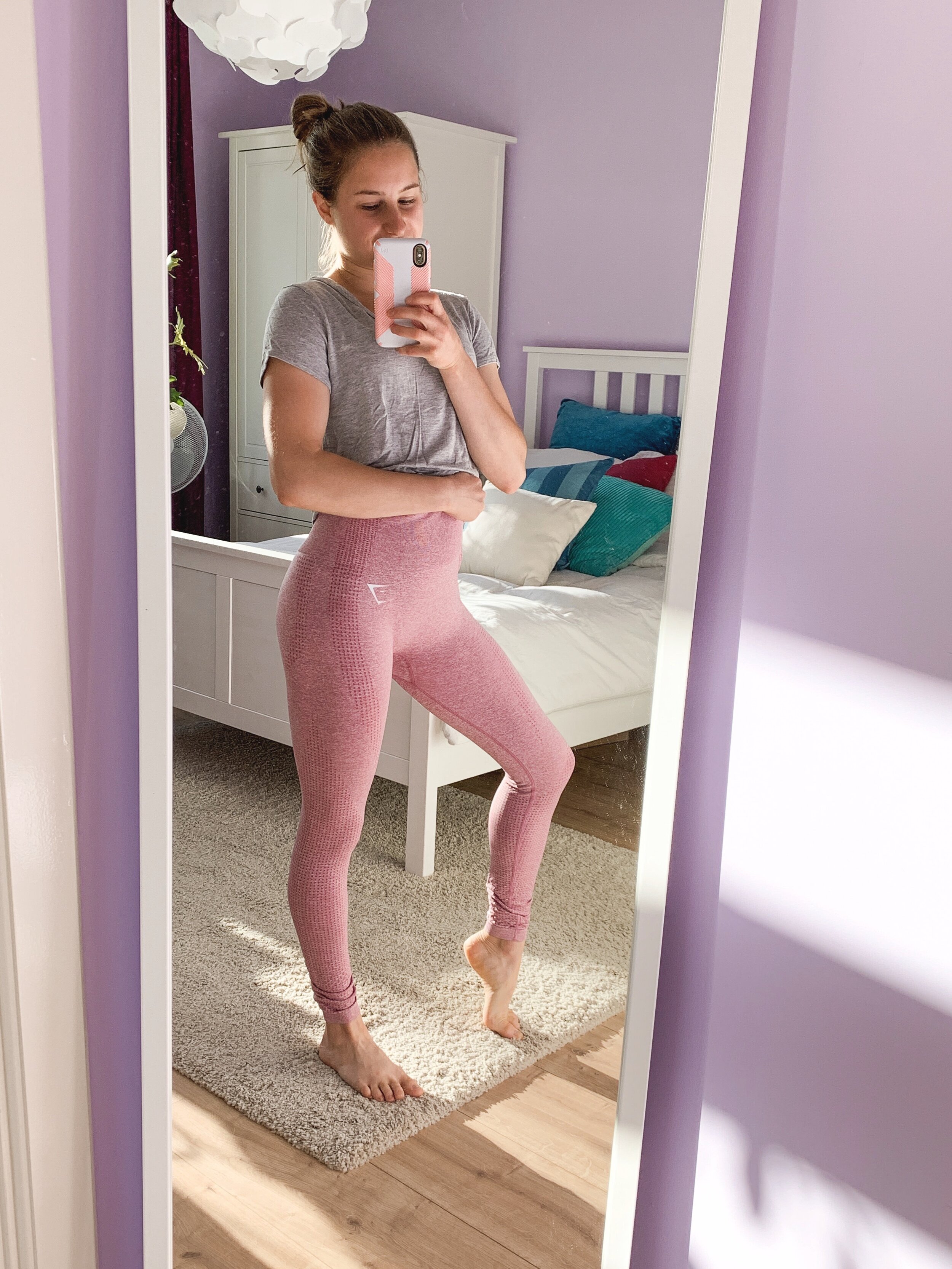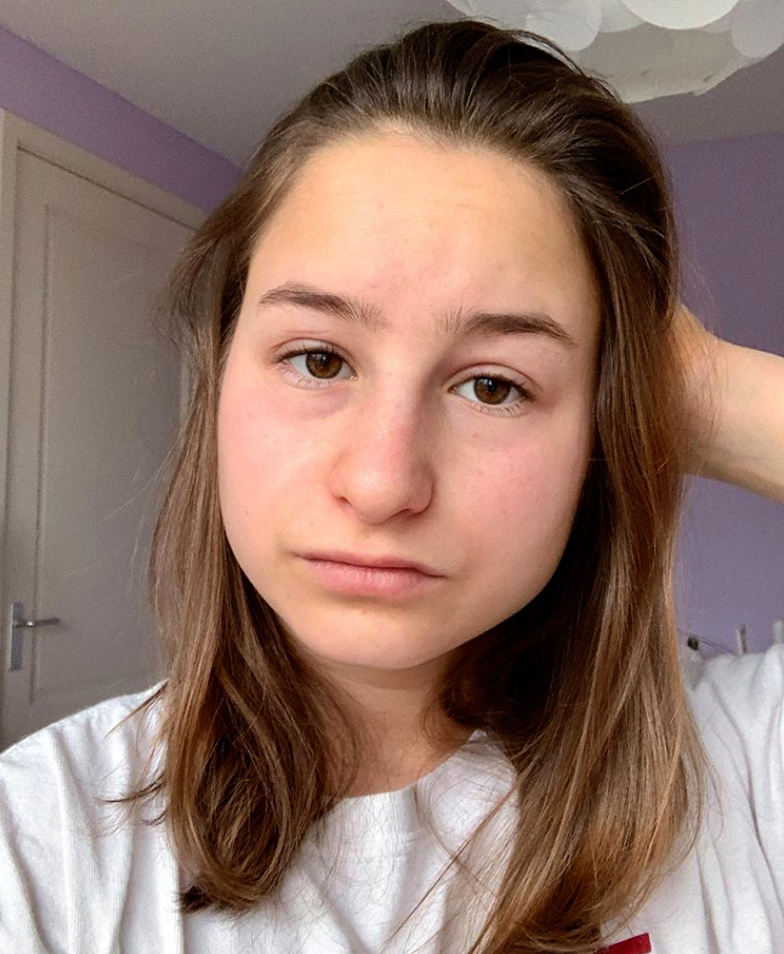Coping with Weight Gain


Weight gain; one of the most important, yet most difficult parts of recovery. Of course, all eating disorders come in different shapes and sizes and the weight gain aspect will look different for everyone. Even people that don’t fall under the medical category “underweight” may find themselves gaining weight when they commit to true recovery because they are still malnourished in several ways. No matter where you’re coming from though, seeing your body change can be extremely difficult and may even seem impossible to accept at times.
However, you are not alone and FULL RECOVERY is 100% possible, regardless of the weight that comes with it! Weight gain is a physical process, but it’s a mental one just as much! So in today’s post, I’m addressing both sides of weight gain and sharing all my tips for coping with it. Please keep in mind that below tips/advice comes from my personal experience with weight gain and is everything that worked for ME; it may not necessarily work for you! So take what you need and leave what you don’t: recovery is a personalized process and the choices you make to support your own recovery will be unique to each individual. So without further ado, my tips for coping with weight gain!
1. Aim for ACCEPTANCE rather than LOVE
There’s a lot of women on Instagram and other social media platforms promoting body-positivity, body-love, embracing fat rolls, touching thighs, cellulite, and several other aspects that diet culture has taught us to hate about our bodies. These women (and men?!) are absolutely AMAZING and it is so beautiful to see that they have found a loving relationship with their bodies. However, many of us, especially those fresh in recovery from an eating disorder, cannot even IMAGINE loving our bodies like those body-positive figures do. And you know what? That’s OKAY. You don’t NEED to love your body. Especially during this difficult process of weight gain.
We don’t need to love something in order to accept it. For example, we all need to go to the bathroom every day. I think I can go out on a limb and say most of us don’t LOVE going to the bathroom, but we accept the fact that it’s a daily activity and therefore we don’t complain! Maybe a silly comparison, but you get my point… because the same thing goes for having fat on our bodies! It’s NECESSARY for our health to have fat on our bodies. Many of us don’t LOVE seeing it, holding it, having thighs touch, etc, but we need to ACCEPT that this fat, our bodies touching in places we are not used to, is keeping is alive and is necessary for our health.
2. Practice Gratitude for what your body can do
So body acceptance is cool and all, but how do you learn to put it into practice? To be honest, this takes time. You most likely will not wake up one day with "Hey! Wouldya look at that, I finally accept my body!". However, there are several things you can do during this acceptance journey, and practicing gratitude is one of them. One thing I did every day during my recovery that allowed me to accept my body (and eventually love it!) is writing down one thing about my body that I was grateful for and why. You can start with the ‘easy’ body parts such as hands and feet etc, and work your way up to being grateful for your stomach and more ‘challenging’ body parts as you get comfortable with this practice. An example of a gratitude entry for me would be:
I am grateful for my legs because they support me, allow me to walk, run, jump, and dance!
As you can see, it really doesn’t have to be complicated and practicing gratitude for one body part is super quick! It may seem silly at first, but trust me, expressing gratitude for each part of my body was truly a game-changer in my recovery and body-acceptance journey.

3. Stick Affirmations where you can see ‘em!
This is something I personally never needed to do, but it’s something that a LOT of girls I know have really benefitted from. It’s kind of similar to expressing gratitude for body parts, but it’s also really helpful if you feel confronted every time you look at yourself. Affirmations act as a reminder of ‘hey! it’s okay’ and can aid in keeping your cool when you find yourself upset at what’s staring back at you. What you choose to write on your affirmations is totally up to you, but here are some ideas:
-
I look beautiful today
-
My body is thankful to me for showing up, every day!
-
it’s okay to see my body change
-
I deserve to fuel my body
-
I deserve to take up space

4. Don’t Hide from yourself or your reflection
Contradictory to popular belief of avoiding yourself and your body, I believe confrontation is the first step to acceptance. Because how can you accept something without knowing what it looks like?
At almost every treatment facility I’ve been to, mirrors were either blocked, didn’t show waist down, or we were simply strictly advised to avoid looking in the mirror otherwise know as ‘body checking’. It was also ‘advised’ to avoid any of this kind of behavior when you went on ‘pass’. Furthermore, I was told to delete any past pictures of my (thinner) self because this could be ‘triggering’ and wouldn’t help me progress throughout my recovery. But ANYTHING can be triggering as long as you give it the power to be that.
While I do know many girls who have found avoidance helps their healing process, it’s personally something I can’t stand behind. I believe you can only accept and embrace change when you are AWARE, and in some cases, I feel avoidance can only make the situation worse and lead to more frustration! An example of this for me, was when I went on my first ‘pass’ during my stay at Carolina House. I hadn’t been able to see how I looked like in a mirror for months, so the first thing I went to do was look up a mirror so I could finally see what my new, bigger body looked like. When I finally did, I was shocked. I wasn’t unsatisfied with what I saw and definitely thought I looked better, but I was also upset that I had changed this much without having been able to slowly acclimate to it over time. It’s like the abstention of seeing myself resulted in a slap in the face when I finally could see what I truly looked like.
I feel the same goes for seeing your weight or anything along the lines of ‘body knowledge’. I wasn’t allowed to know my weight during my treatment at Carolina House, nor was I allowed to know how much I’d gained, or what the staff wanted me to gain over time. So what did I do as soon as I got home after treatment? I weighed myself. I mean, it was bound to happen! We are human beings, naturally curious and rebellious. So when you’re not 'allowed’ to do something, you will do it as soon as you get the chance to. I could honestly ramble on about how ‘forcing’ anyone to do something never ends well, but you get my point.
Like I said above, OF COURSE you should not body check, look at sick photos, or weigh yourself if it causes you to use behaviors and acts as a blockade in your recovery! All I’m saying is that this method does not work for everyone and can work in a backfiring manner if it’s not something that you (YOU, not your ED!) agree with. This is YOUR recovery and you know the best what’s most and least helpful. Be honest with yourself and evaluate what you need, every step of the way.

5. Treat yourself to a new wardrobe
Shopping for new clothes can be really challenging for several reasons, from realizing you have to get rid of clothes because they no longer fit you, to the actual part where you’re in the store and can no longer purchase the smaller/smallest size. But here’s the catch: clothes are meant to fit YOU, not the other way around!
I’ve gotta be honest and say that during the whole weight gain part of recovery, growing out of my clothes was the hardest part. All my life I was used to purchasing the smallest size (even as a kid), so when I had gained so much weight after my ED that I had to actually start buying bigger sizes, I was upset. Upset that there were other people that did fit into those sizes, but I wasn’t one of them. Jealous of imaginary people that seemed to have the ‘perfect’ figure so their stomach doesn’t bulge into the waistband of those cute high rise leggings from American Eagle. Mad at myself for allowing myself to eat all the food that caused this disaster of not being able to fit into the smallest size.
But all of this frustration, these negative emotions, come out of a place of fear. Fear of change, fear that I am not worthy, fear that other women who DO fit into the smallest size are ‘better’ than me. But can I tell you a secret? YOU ARE NOT A KID ANYMORE. Women are supposed to have curves and fat on their bodies, it’s something that’s normal and healthy and should happen! Do you know what percentage of people ACTUALLY fits an XXS or 00 jeans? Not many. And besides, everyone’s body type is different. Your WORTH is not defined by the body you were given, nor is anyone better or worse because they are able to fit into a different size of clothing.
On top of that, a size is just a size and is often not even accurate! I have clothing that ranges from size XS to XL, I’m not even joking! Three different brands of jeans can all be labeled the same "size", yet all fit differently. You may have size M leggings and XS tank top. Does that mean your legs are less worthy than your torso? No. So get rid of anything and EVERYTHING that no longer fits you. And you may be thinking: "well what if my weight redistributes and I eventually fit back into those smaller clothes?". We’ll cross that bridge when we get there. Right now, the clothes that no longer fit you, simply no longer fit you. Sell em. Donate em. Give em to your little sister or a friend! Make someone else happy with a piece of cloth that only makes you mourn.
Now go out and treat yourself to clothes that FIT YOU. Clothes that make you feel comfortable, and pants that stretch so you STILL feel comfortable after you’ve eaten and leave room for bloat. I swear, my stretchy Target pants are my LIFESAVER! ;)

6. Focus on all the other things you’ve gained
Because weight gain isn’t the only thing! At first, it may seem like you’re actually LOSING everything. It may seem like you’re losing all control, while actually the complete opposite is happening! Your ED was in control for so long, now YOU are finally taking the reigns over YOUR life; the way it should be! However, this may be hard to see in the beginning. You may feel like you are losing everything that felt safe; being small, being obsessed with exercise, the daily routine and rituals you created around food…basically, living in a snowglobe created by your eating disorder.
Although it seems like this is the "safe" option that tricks you into thinking you are happy, you are not happy deep down. Otherwise, you would not be reading this! ;) You know deep down that there is a better life waiting for you, a life you are creating for yourself as we speak. The reality of it all is that you have NOTHING to lose and EVERYTHING to gain: relationships, being able to go out to eat, enjoying food, being able to exercise for joy instead of compulsion, having energy, getting ice cream with your family, being able to think about things OTHER than food…there’s so much more to life than obsessing over our bodies, food, or what anyone else thinks of us. Give recovery a try. You’ll see what’s out there!

7. Don’t pretend it’s Easy
Wait gain is f*cking hard. Like I said before, it’s one of the hardest parts of recovery. Telling yourself it’s ‘not a big deal’ and that ‘you can handle it’ is only a way to numb out the true emotions you feel about this horrible process. It’s going to be uncomfortable and it’s going to hurt at times. You will miss your smaller body and will get upset seeing other people ‘with perfect figures’ and so much more. You’re going to feel full, get bloated, and want to crawl out of your own skin. And that’s OKAY. Allow the feelings to be there. Cry it out. Stomp on the ground. Throw ice at a tree. Punch a pillow! Do whatever you need to get your anger and frustration out, because you’re finally giving up your ED and that’s all that matters. If it was easy, there wouldn’t be treatment centers all across the world. There wouldn’t be self-help books. There wouldn’t be tens and thousands of recovery coaches and instagram accounts promoting health and balance if this was all easy. So allow it to be hard and allow yourself to feel the emotions. Acceptance is the key to growth.

8. Make a list of reasons to recover
Your own, personalized list of ALL the things you’re doing it for. Your motivation for recovery, things you can do once you’re healthy again, things that excite you just thinking about ‘em! When making this list, it’s important to only include reasons for YOU. Not for anyone else, that won’t help. It’s a list made by you for you, so that you can always look back on it when you need a reminder of what you’re doing it all for. And this can (and should!) totally be a running list, as you will feel inspired to add or remove things as you progress through your recovery.
I hope this post is helpful for anyone struggling with weight gain and how to cope with it. I’d love to hear your thoughts and/or if you have anything specific that helped YOU!



